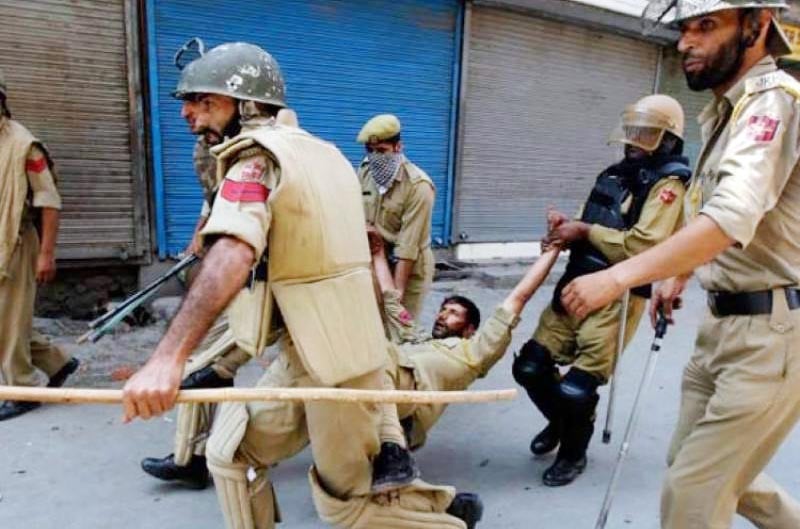
To be openly anti-death penalty and then falling at the first real hurdle…

Normal has a relative meaning when it comes to India and Pakistan. Indian and Pakistan troops have been exchanging fire at the Line of Control regularly this week -- resulting in a number of casualties on both sides, including civilians on the Pakistan side.
This number count between deaths on this side and the other rather misses the point. Entire populations, as well as soldiers who guard borders, are hostage to this violence and already victims of in one sense. The actual deaths on both sides, as well as allegations, are manifestations of the violence inherent in our attitudes towards each other. This is not meant to suggest that the loss of life is not important -- it is incredibly sad and destroys lives -- but that keeping count of bodies adds to the violence instead of reducing it.
Mian Nawaz Sharif being under a political siege is not helping matters -- and Modi is indeed not playing fair by ratcheting up the ante to make things difficult.
Pakistan’s tragedy is that India has been remarkably successful in convincing the world that cross-border terrorism is the principal concern in Indian-controlled Kashmir. Most analysts would agree that Pakistan based non-state actors’ actions in Kashmir do pose a serious problem but this does not take away from the human rights violations being committed by Indian forces in Kashmir. The trick for Pakistan’s diplomats, and government, is to re-write this narrative at the international level. This will of course involve some candor and admissions -- which could well be embarrassing but not necessarily fatal to the larger goal.
India for its own part must stop pretending that while Balochistan is a human rights issue it is concerned about, Kashmir is an internal problem. Modi is smart and knows how to up the ante so he deliberately threw in Balochistan to hit a raw nerve -- this was not coincidental.
Many Pakistanis remember the wounds of 1971 and there is an entire Pakistani narrative about the role India played. It was those raw nerves that Modi hit. And for some time it seemed to have worked -- since most Pakistani statements tried to differentiate between Balochistan and Kashmir. But a better strategy might have been to play on Modi’s turf and tell him, "Sure, let us talk about Balochistan if you open up Kashmir’s human rights situation too".
The people of Kashmir, on both sides, gain nothing from the violence. A couple of weeks ago I was in India for an international conference where India championed its emergence as a tech-industry giant. Also celebrated were the range and accessibility of the internet available in India today. However, spare a thought here for those from Indian Kashmir at this conference who, thanks to a government blockade, did not have access to the internet in Kashmir.
For people who live in cities, these problems of access may not matter much. But for a people whose lives are tainted by violence from all sides every day, this was another example of their marginalised status. If the lessons that India and Pakistan want to teach each other are based on guns and bullets then this madness will consume our lives and those of our future generations. It will also consume, and indeed it has, the lives and dreams of Kashmiris who are essentially the loved one both fight over, without letting the loved one have a say in the matter. Both states speak for and on behalf of Kashmiris, both install guns in Kashmir and kill each other -- while Kashmiris are left to cover their ears and bury their dead.
There is no reason for Pakistan to be defensive about its support for Kashmir and the protection of human rights in that region. However, Pakistan has baggage of its own and in order to make headway we need to stop pretending that the world will not think of the role we have played -- or did not play -- in arriving at where things stand.
Like it or not, the talk of terrorism (especially terrorism in the name of religion) dominates the global concern today. And any allegation, even if untrue, taints one’s ability to make a difference. Therefore Pakistan needs to revisit its stance on Kashmir -- by admitting the mistakes made here and -- by aggressively telling the world all that it has done to curb the problem emanating from within. And once that is done, the focus needs to be on all that the Indian state has gotten away with and continues to get away with in Indian Kashmir.
We cannot expect anyone to listen if we talk about human rights while refusing to talk about the weakness in our case -- it is only by confronting head-on the weaknesses in one’s own case that you can throw an opponent off-balance.
Our central concern needs to be the dignity of Kashmiris and if we can admit where we have fallen short till now, we have a much better chance of making a difference for the better moving forward. Both states need to silence the guns on the Line of Control -- not just because it causes casualties but because each new casualty is then used as a justification to seek revenge with another.